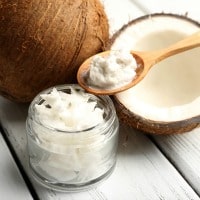Coconut oil has previously been thought of as a “bad fat”, as it contains saturated fatty acids. Recent studies have shown that natural sources of saturated fats are actually not only not “bad”, but are beneficial, particularly for the brain. A new study, conducted at the Postgraduate Program in Cardiology at the School of Medicine, Universidade Federal do Rio de Janeiro, evaluated the health effects of extra virgin coconut oil. The study focused primarily on how coconut oil affects HDL cholesterol and a range of other measurements, such as body weight, size, and circumference.
Participants were all hypertensive, 63.2% male, with ages ranging from 54 to 70 years. 94.5% had blood lipid profiles indicating dyslipidemia and were taking standard cholesterol-lowering drugs. For the first three months, 136 participants were put on a standardized diet. For the third month and onward, the 116 who completed the first phase were placed in two intervention groups. The first group contained 22 participants who remained on the diet. The remaining 92 were put on the diet and given an additional 13 ml of extra virgin coconut oil daily (equivalent to approximately one tablespoon).
The results at the end of the three months showed that the group of participants taking coconut oil saw a decrease in all six of the bodily parameters measured, including weight (reduction of .6 kilograms), body mass (reduction of .2 kg), waist circumference (reduction of 2.1 cm), neck perimeter (reduction of 4cm), systolic blood pressure (reduction of 3.3 points), and diastolic blood pressure (reduction of 3.5 points). Participants also saw a 3.1 to 7.4 mg increase in HDL cholesterol.
The researchers concluded that “nonpharmoacological interventions are essential for risk factor control in secondary prevention among patients with coronary disease. Our study showed that a diet rich in extra virgin coconut oil seems to favor the reduction of WC and the increase of HDL-C concentrations, raising with secondary prevention for CAD patients.”




